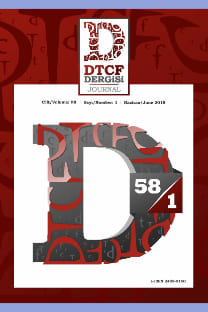CRITICISM OF THE POLITICAL SYSTEM ON A MICROCOSMIC LEVEL: GLOBAL POLITICS IN AN INDUSTRIAL TOWN IN JOHN ARDEN'S THE WORKHOUSE DONKEY
John Arden'in The Workhouse Donkey isimli oyunu, kuzey İngiltere'deki bir kasabadakurgulanan yerel politikaları ve yerel yönetimdeki yozlaşmaları alaycı bir şekildeeleştirme amacıyla betimler. Gerçek bir olaydan yola çıkarak kurgulanan oyun özelliklepolitik hayatın Birleşik Krallık'ta endüstriyel bir kasabada nasıl yaşandığına odaklanır.Arden'e göre oyunun geçtiği yer ve karakterler, oyunun teması açısından önemlidir. Bunarağmen oyunda sergilenenler, kuzeydeki bir kasabanın bölgesel sorunlarını aşar.Oyunda mikrokozmik seviyede işlenen sorunlar, aslında evrensel düzeyde politik hayatınbir yansımasıdır, sistemin yerel düzeydeki temsilinden öte, oyun, sistemin kendisinieleştirir. Belirli bir politik partiyi ya da politik görüşü hedef almaktansa, politik sistemieleştiren oyunun, bu nedenle de politik bir tavrı vardır. Bundan dolayı bu çalışmanınamacı, The Workhouse Donkey isimli oyunu detaylı bir şekilde incelemek ve kuzeydeki birkasabanın yerel politikası kapsamında günümüz politik sistemini karikatürize eden buoyunu, Bernard Crick tarafından öne sürülen politika ve çokça tartışılan tanımlarbağlamında değerlendirmektir.
BİR SİYASİ SİSTEM ELEŞTİRİSİ: JOHN ARDEN'İN THE WORKHOUSE DONKEY İSİMLİ OYUNUNDAKİ KÜRESEL VE YEREL POLİTİKALAR
John Arden's The Workhouse Donkey depicts the local politics of a northern English town in order to criticise the corruptions within the local government in a mocking way. Derived from a real-life story, the play speci?cally focuses on the political life that can be experienced in an industrial town in the United Kingdom. According to Arden, the setting and the characters are important for the theme of the play. Nevertheless, what is portrayed in the play transcends the regional problems of a northern town. On the other hand, what is treated in the play on a microcosmic level is, in fact, a re?ection of politics on a macrocosmic, global level since it is the system that is being criticised in the play regardless of its local representation. Hence, the play has a political tone that criticises the political system rather than targeting a political party or a political view. Thus, this study aims to offer a detailed analysis of John Arden's play The Workhouse Donkey in order to justify the signi?cance of the play as a criticism of contemporary political system caricaturised as in the scope of local politics in a northern town in line with the muchdebated de?nitions of politics proposed by Bernard Crick.
___
- Arden, John. Plays: One. "Author's Preface." London: Methuen, 1977. 112-114.
- ---. Plays: One. "The Workhouse Donkey." London: Methuen, 1977. 115-236.
- ---. To Present the Pretence: Essays on the Theatre and Its Public. London: Methuen, 1977.
- Avery, Gillian. "The Punch and Judy Show." Children's Literature 15 (1987): 193- 196. Project Muse. Web. 16 March 2016.
- Clayton, Philip Terry. "The Drama of John Arden as Communal Ritual." U of Cincinnati, 1973. ProQuest Dissertations and Theses. Web. 07 March 2016. Crick, Bernard. In Defence of Politics. U of Chicago P, 1962.
- Dermiş, Hüseyin H. The Conflict Between the Individual and Society in John Arden's Commercial Plays. MA Thesis. Hacettepe University, 1987. Ankara: Hacettepe University, 1987.
- Gaston, Georg and John Arden. "An Interview with John Arden." Contemporary Literature 32.2 (1991): 147-170. JSTOR. Web. 08 March 2016.
- Malick, Javed. Toward a Theater of the Oppressed: The Dramaturgy of John Arden. Ann Arbor: U of Michigan P, 1995.
- McKernie, Grant Fletcher. Politics in Modern British Drama: The Plays of Arnold Wesker and John Arden. Diss. Ohio State University, 1972. ProQuest Dissertations and Theses. Web. 07 March 2016.
- Wager, Walter, Simon Trussler and Kelly Morris. "Who's for a Revolution?: Two Interviews with John Arden." The Tulane Drama Review 11.2 (1966): 41-53. JSTOR. Web. 07 March 2016.
- ISSN: 0378-2905
- Yayın Aralığı: Yılda 2 Sayı
- Başlangıç: 1942
- Yayıncı: Ankara Üniversitesi Dil ve Tarih-Coğrafya Fakültesi
Sayıdaki Diğer Makaleler
TÜRKÇEDE GENEL ADLAR: KADIN VE ADAM
UWE TIMM'İN "KARDEŞİMİN ÖRNEĞİNDE" (Am Bespiel meines Bruders ) BELLEK YANSIMALARI
GIUSEPPE TOMASI DI LAMPEDUSA VE "IL GATTOPARDO" DA YAŞAM, ÖLÜM VE SONSUZLUK ARZUSU
SARAH KANE'S CLEANSED AS A CRITICAL ASSESSMENT OF DISCIPLINARY POWER
FARKLI GERÇEKLİKLERİ DİLE GETİRMEK: MIDNIGHT'S CHILDREN'DA ÇOK SESLİLİK VE BÜYÜLÜ GERÇEKÇİLİK
ULUSAL STRATEJİLER ÇERÇEVESİNDE BİRLİKTE ÇALIŞABİLİRLİK EYLEMLERİNİN DEĞERLENDİRİLMESİ
SAİME ÖZLEM GÖKKURT DEMİRTEL, Hakan DEMİRTEL
OSMANLI DÖNEMİ'NDE KULLANILAN İKİ ANALOG BİLGİSAYAR: RUBÛ' EL-MÜCEYYEB VE PERGÂR-I NİSBE
